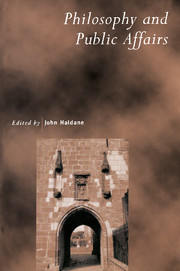Book contents
- Frontmatter
- Contents
- Notes on Contributors
- Introduction
- In Defence of Individualism
- Market Boundaries and Human Goods
- A Tale of Three Karls: Marx, Popper, Polanyi and Post-Socialist Europe
- Liberty's Hollow Triumph
- Politics, Religion, and National Identity
- Contemporary Art, Democracy, and the State
- Popular Culture and Public Affairs
- Welfare and the State
- Questions of Begging
- Philosophy and Educational Policy
- What did John Dewey Want?
- Educating for Citizenship
- Being Human: Science, Knowledge and Virtue
- Index
Politics, Religion, and National Identity
Published online by Cambridge University Press: 20 May 2010
- Frontmatter
- Contents
- Notes on Contributors
- Introduction
- In Defence of Individualism
- Market Boundaries and Human Goods
- A Tale of Three Karls: Marx, Popper, Polanyi and Post-Socialist Europe
- Liberty's Hollow Triumph
- Politics, Religion, and National Identity
- Contemporary Art, Democracy, and the State
- Popular Culture and Public Affairs
- Welfare and the State
- Questions of Begging
- Philosophy and Educational Policy
- What did John Dewey Want?
- Educating for Citizenship
- Being Human: Science, Knowledge and Virtue
- Index
Summary
This essay is not a further contribution to the debate about liberal individualism, the chief topic of discussion in political and social philosophy for the last twenty-five years or more. Nevertheless it is necessary to begin by rehearsing some features of that debate, claims that will be very familiar to contemporary political philosophers. Inspired largely by John Rawls, the modern version of political liberalism has tried to make coherent a conception of politics according to which political affairs should be separated, or at least seriously distanced, from the various moral and religious loyalties and programmes of individuals and groups of citizens. This central contention of Rawlsian liberalism has been expressed in different ways, but according to one of the commonest versions, it is to be interpreted as the view that the right must take precedence over the good. That is to say, in the political sphere, the implementation and application of impartial rules of social justice and civil liberty (the right) must take precedence over competing conceptions of what is or is not a valuable way of spending a human life (the good). Another familiar way of expressing the same doctrine says that the state must be neutral with respect to the moral alternatives with which a modern pluralistic society presents its members. This claim about state neutrality is most easily illustrated by a notable example; whether homosexuality is morally wrong or not is not the business of the legislator, and thus the goodness or badness of a gay lifestyle is a matter on which the law should be neutral.
- Type
- Chapter
- Information
- Philosophy and Public Affairs , pp. 73 - 84Publisher: Cambridge University PressPrint publication year: 2000



